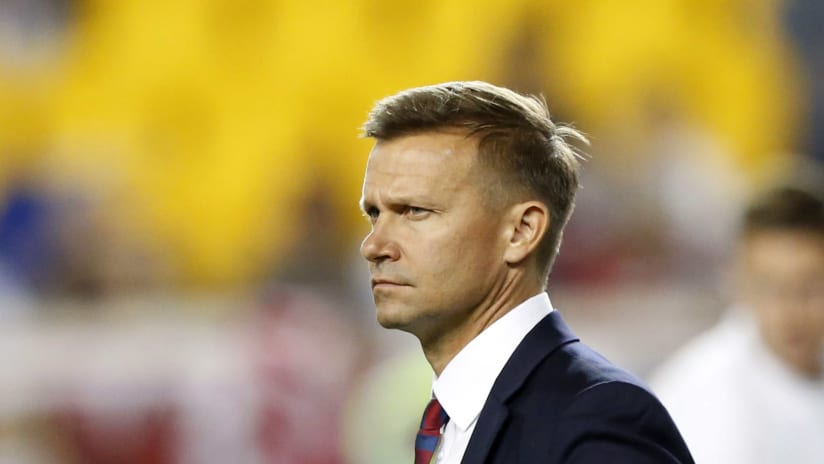Major League Soccer fans have gotten used to the current reality of the New York Red Bulls, but there was a time in the recent past when the club’s identity was closer to one you’d expect from the branding “New York.”
It was six years ago, when Thierry Henry was the second-biggest star on the MLS landscape and Rafa Márquez looked like a shrewd attempt to penetrate the Mexican-American market. It was back before the specter of NYCFC began to emerge on the horizon, back when the dreams of Red Bulls using its new arena to become Galaxy East seemed faintly possible.
This was one year after the David Beckham Galaxy had broken through to claim that core’s first title (the Galaxy’s third overall). People were still debating whether teams that had Designated Players could win titles, and while, in hindsight, that discussion seems ill-founded and counter-intuitive, that was a real thing which multiple people actually put into the world.
To see today’s New York Red Bulls, as the Portland Timbers will on Saturday (4pm PT, ROOT SPORTS), is to see the modern incarnation of that debate, albeit in a more measured tone. Though the team still have two DPs on their books (Bradley Wright-Phillips and the newly-signed Kaku), over the last two years, they’ve also said goodbye to a number of core talents. Dax McCarty was traded last season. Sacha Kljestan was dealt in January. Felipe was sent to Vancouver two weeks ago. The midfield core that led the club to the 2015 Supporters’ Shield has, over the course of 15 months, found itself in other homes.
This is the path the Red Bulls chose in the wake of the Henry era, one that was not only informed by ownership’s preferences but also by the success of teams like Real Salt Lake. When New York moved away from its big-spending ways, they did so in a time where RSL was the prime example of measured growth. Under general manager Garth Lagerwey, Real Salt Lake had built the league’s most enviable core, eventually using that group to compete over a seven-year stretch despite a lack of high-priced talents.
For teams like the Red Bulls, the question was obvious. Why do we have to spend so much to create a contender when teams like RSL are doing it on a budget?
There is no obvious answer to that question, but with each organization in MLS, you see preferences. Houston was able to make last year’s Western Conference finals with one of the lowest payrolls in the league. At the other end of the spectrum, teams like Atlanta and New York City have used targeted spending to accelerate their expansion growth. In between, teams like Portland and Seattle have proved willing to spend, but not spend for the sake of doing so.
On that spectrum, the Red Bulls have chosen to sit closer to Houston, albeit with a couple of advantages teams like the Dynamo are still trying to develop.
The first is a youth system that is producing in line with MLS’ best. U.S. international Tyler Adams, only 19, has become the poster child for that movement, but the development of Sean Davis, Derrick Etienne, Connor Lade and Alex Muyl speaks to the point Red Bulls are at in their project. Beyond the high-profile academy alums like Juan Agudelo and Mike Miazga, the team’s academy has become capable of meaningfully augmenting the depth of its first-team squad. There is an actual production line in place, one that has allows the team to trade McCarty, Kljestan and Felipe while each retained their value.
The second advantage is Jesse Marsch, as well as the faith the organization has put in its head coach.
When he arrived at Red Bull in 2015, Marsch was known as a former U.S. international midfielder whose first foray into head coaching ended after one season in Montreal. Unfairly, people used that time to brand Marsch, and although his presence as a media analyst following his departure reminded fans of his acumen, when New York chose him to replace Mike Petke, Marsch was already seen as a recycled coach.
The Red Bulls, though, proved to be a perfect place for a young coach who’d been thrown into a difficult situation in Montreal. Instead of being a rookie boss tasked with managing Alessandro Nesta, Marco Di Vaio, Patrice Bernier and Matteo Ferrari, Marsch was handed a team almost devoid of major stars. Kljestan was the biggest name on a team that was transitioning out of its Henry era, moving into one that was pursuing a less top-heavy approach.
In that space, Marsch has been able to mold an identity of his own, one that’s born of his soccer principles instead of the talents he inherited. No characteristic embodies that more than the pressing style that has made the Red Bulls one of the most difficult opponents in Major League Soccer. The culture of commitment and work that approach demands is one every team wants, but it’s much easier to instill when a squad doesn’t have competing notions. From Academy to MLS, Marsch has been able to instill a consistent philosophy, one that’s not only brought first-team success but has allowed Red Bulls II to be one of the most successful MLS affiliates in USL.
Whereas once the Red Bulls’ identity was tied to its Thierry Henrys, now, that identity rests in the vision of Jesse Marsch. He’s the club’s figurehead, a presence that’s remained as the roster has turned over, and somebody who’s assured the way the team plays is as important as the players who execute the approach.
Henry is gone, as are McCarty, Kljestan and Felipe. But Marsch remains, and as long as he does, we’ll know what to expect from the Red Bulls.












